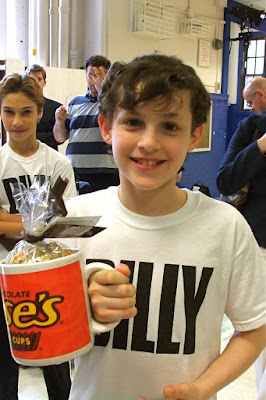Sunday, November 9, 2008
Role Models
I really enjoyed Role Models. I laughed hard, thoroughly enjoyed the story and thought the chemistry among the four leads was wonderful. Paul Rudd and Seann William Scott are energy drink peddlers who have a really bad day. That leads to 150 hours of community service in Sturdy Wings (think Big Brothers) with the oldest misfit Angus (Christopher Mints-Plasse) and the youngest, the foulmouthed, breast obsessed Ronnie (Bobb'e J. Thompson). The kids help the adults get beyond their self-centeredness.
The film works as a buddy comedy, but the addition of Jane Lynch (I'd nominate her for best supporting actress for this role) is inspired brilliance. She is absolutely incredible and adds this layer of social bite and laugh-out-loud humor to the film.
The film is not a gross-out comedy, to my relief, but it's not for the faint of heart where language is concerned. That said, I don't think there was a wasted swear word (and there are hundreds) in the film.
Writer/Director David Wain has a gift for taking overplayed ideas and turning them into quality comedies. Would that Judd Apatow take a lesson from him. His Hot Wet American Summer is also a fine film, a riff on the teen camp comedy. Role Models riffs on the buddy movie to great effect.
This is one I'll see again.
More Billy
I'm still thinking about Billy Elliot. There are a few subversive moments in the show that are staying with me. The second act opener is a Christmas pageant that is this light, poppy condemnation of Margaret Thatcher. It turns into an audience sing-a-long that has the audience singing along wishing for the death of Maggie Thatcher. I'm not sure most of the audience realizes that's what the song is promoting. That's cool.
Groovelily
My first contact with Groovelily was in 2006 when I read about their new show, Striking 12, which had an off-broadway premiere to excellent reviews. I put them out of my head since I wasn't going to be in NYC during the run of the show.
Last night, I had my first opportunity to experience Groovelily live, and it was a thrilling experience. Groovelily has a wonderfully eclectic style that combines elements of theater, jazz and good, old-fashioned rock 'n roll to powerful effect. The music is really driven by the six-string electric violin played by Valerie Vigoda, the founding member of Groovelily. Vocals are shared by keyboardist Brendan Milburn and drummer Glen Lewin, and all three shine as musicians and vocalists. The playlist constructed to give each a number of chances to shine.
The gig last night was a combination of album cuts, songs from theater performances and some new material that will be premiered in a new show next spring. The set was punctuated with a narrative that contextualized the songs and the history of Groovelily. Sometimes the talking seemed a bit much, but it made for a delightful connection between the musicians and the audience.
Groovelily are unique and an always fascinating group. There is great energy in the room and every reason to just want to hang with the band members. They'll be in heavy rotation on the iPod.
Monday, November 3, 2008
Equus
I have always appreciated Equus as a complex and disturbing meditation on passion. I've seen a few productions of it, including a strong production at the Stratford Festival with Brian Bedford as Martin Dysart. Saturday evening I had the opportunity to see the excellent production currently on Broadway with Dan Radcliffe as Alan Strand and Richard Griffiths as Dysart. Radcliffe and Griffiths anchor a fine cast in a compelling production.
Equus is a stylized play that is generally given a stylized production, including this one. The actors portraying the horses have the stylized horse heads and hoofs of most productions, but they also have uncharacteristically hot bodies. The opening image of Alan embracing the horse Nugget has a homoeroticism that is often left unstated.
The word on Radcliffe is absolutely accurate. He more than holds his own in a role that challenges even the best actors. His Alan is a troubled young man who has committed an unspeakable act, but he engages us.
Griffiths, too, creates an indelible portrait of a man who is changed by and ultimately envious of Alan. Griffiths portrait is interesting in that it takes a natural, understated approach. Sometimes it feels a little out of place among a cast delivering very stylized performances. But in the end, it's extraordinarily effective to have a human Dysart.
The rest of the cast are strong. Kate Mulgrew and Carolyn McCormick have particularly powerful moments. MoCormick has a particularly difficult task on the stage, since much of the blame for Alan's actions falls on her. It to McCormick's credit that we anger, pity and feel for Dora Strang.
The production is not unlike other productions of Equus, but there are a few revelatory moments. The moment in which Radcliffe blinds the horses is a choreographed melange of sound and image that left me breathless.
Some have argued that the play is dated. If taken as a literal commentary of psychiatry and the justice system, perhaps so. But I don't think the play has ever worked on that level. Even as it tries to root out the reasons for Alan's actions, the more interesting study is the effect that Alan has on Dysart. And on that, this production of Equus shines.
Sunday, November 2, 2008
And Please, Billy...
I've been waiting years to see Billy Elliot on Broadway. When the show opened in London in 2005, the reviews were great. The score, by Sir Elton, is his best by far. The cast recording is a bittersweet emotional experience. Heading into the show, I had hopes that Billy Elliot would have the same effect on me as Ragtime, another show in a huge production with dark material and serious issues for our time. Did it deliver?
I think the only answer to that question can be "half way." I loved the show, and I left thinking how much better it could be. First, the bad news: In 2008, Billy Elliot feels incredibly derivative. In fact, my least favorite moments seem pulled directly from three current Broadway shows. In Act I, during the otherwise fantastic "Express Yourself" duet between Billy and Michael, giant-sized puppets more than reminiscent of Wizardmania in Wicked totally distract from one of the most beautiful and sweet moments of the show. Act II begins with a "tribute" to Maggie Thatcher in which a giant Thatcher puppet comes over the back of the stage to terrorize the cast (and hopefully--but not, unfortunately) the audience, a la the second act opener of Avenue Q. The least favorite of the least favorite moments in the post-finale finale, that plays like the Mamma Mia megamix that ends that show.
IMamma Mia, it works okay. But Billy Elliot is a bittersweet show with a rather somber ending. To follow that with 15 minutes of the cast dancing to the big songs from the show in tutus is a crass commercial decision that leaves one perplexed, not thoughtful. Ben Brantley, in his review of the London production, warned us to leave before the curtain call starts. Oh that I would have listened.
These problems aren't fatal. That's good, because there is no chance they're going to be fixed. But they do keep Billy Elliot from being great. And what is great about it?
The story is incredibly moving. The story of the young boy who wants to dance set against the backdrop of the miners' strike in Thatcher's England is rich, moving and powerful. The cast is fantastic, particularly our Billy, Trent Kowalik, and Mrs. Wilkinson, Haydn Gwynne, had wonderful chemistry. The ongoing interplay between the miners and the young ballerinas is often poignant and always creative. In fact, the choreography by Peter Darling weaves a thread through the story that supports the narrative and even drives it.
Elton John's score is also wonderful. Sometimes for better, sometimes for worse, the show has a Les Miz familiarity that makes the miners' plight an epic one. But the true success of the score is the intimates moments, such as "The Letter," in which we see the human connection between the characters.
Kawalik is the most experienced of the current Billys, having played the role in London. He's very strong and eminently likable. His scenes with the flamboyant Michael, David Bologna, were the audience favorites, and deservedly so. The scenes are strong, and Bologna is a natural ham who shines.
Ian MacNeil's set is big and complicated, and it always supports the production without overwhelming it. The visual image on the stage is often arresting. And the production puts its own stamp on the material.
So much care has gone into translating Billy Elliot from film to stage, and this big, beautiful, emotional show has so much going for it. One can almost understand the decision to improve the chances for commercial success by leaving people on their feet with big smiles on their faces. Almost. The decision costs the show much of its integrity in the final moments and that's really a shame.

Subscribe to:
Comments (Atom)
